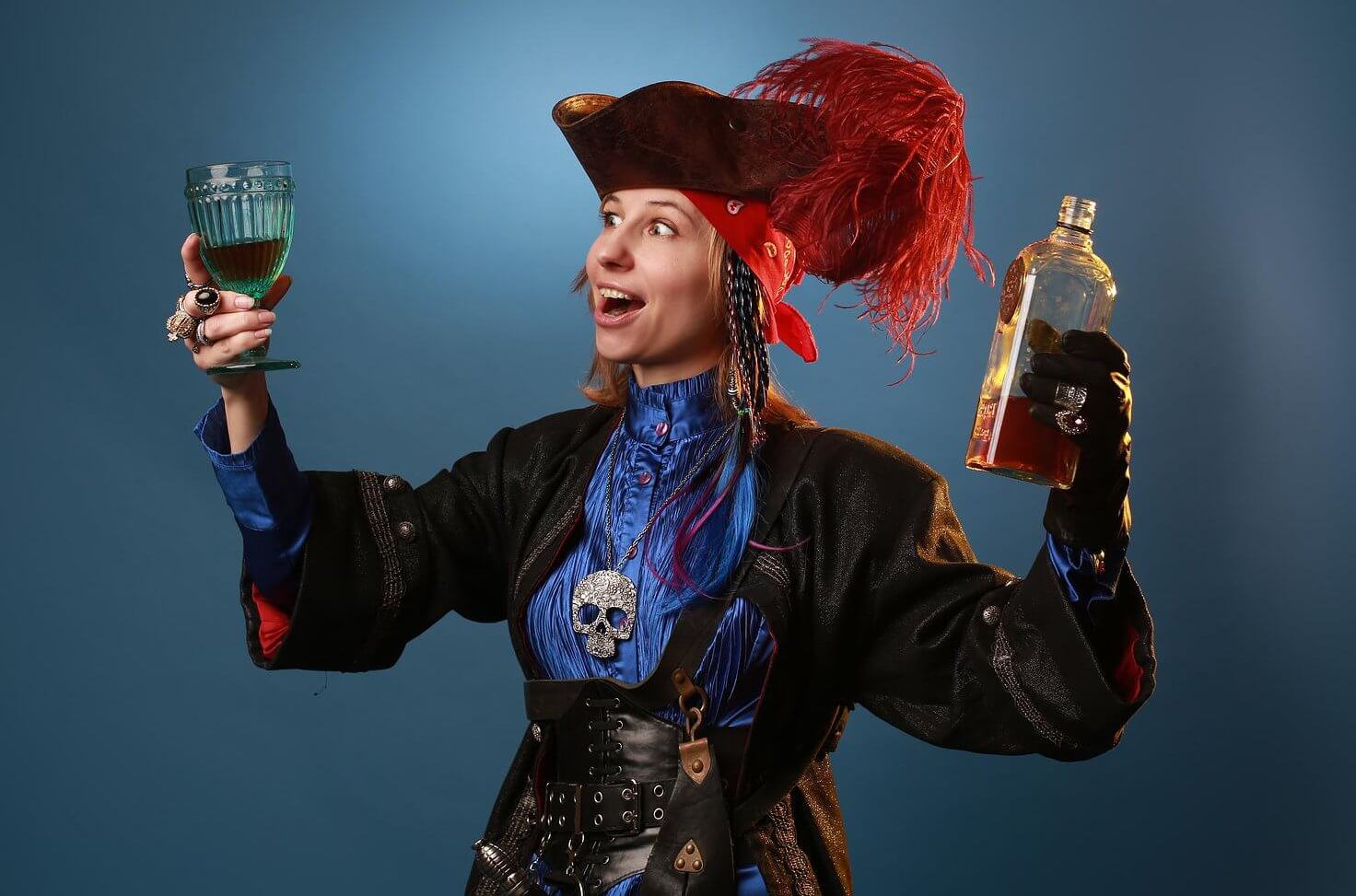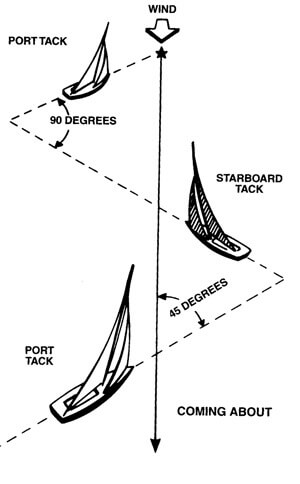Pirates’ canting lingo, shiver me timbers!
The Black Jack was once a barrel, even a table, and it was totally not a card game as we know it now. A remarkable number of maritime words were not landlubber from the beginning, but they have migrated from and under the influence of the romantic image of the Caribbean Pirates. Whatever opinions exist if they were bad or good guys, yet only a few may ague the Pirates of the Caribbean do avalanche the imagination.
Starting from Stevenson’s novels and going on till modern-day comics and movies, anime cartoons, numerous fan art, games and all other kinds of artworks, we always find the Caribbean Pirates’ images in any art epoch.
For this ever-lasting movement we have collected a handy vocabulary of the Pirate jargon of the Golden Age of Piracy we showcase here:
SHIPSHAPE — is for anything in a proper shape for the purpose, being in a great order and worthy. Also, see the definition of “TRIM” down below on this page. The post includes the shipshape contents, no tacking about! Aye!

The purpose of this collection of pirate slang is to fancy a vocabulary when speaking to friends and in social media. These words and idioms represent basically the “maritime jargon” modified by the Tortuga lifestyle of the 17th century, this is how the “pirate slang” appeared, one that we recognize in the artworks. You will notice some of them sneak into the normal language even losing the original meaning. Have fun reading.
SLACK WATER — is a period between a high tide and a low tide, when the water stands still and goes nowhere: neither up nor down. Indeed, the tide is changing the direction while the water is totally calm for a short while. Slack water is a peaceful time, a resting point.
BLACK JACK — this one is not the card game originally, but very likely giving its name to the blackjack card game. The Black Jack was a barrel of bear used in pubs (short from “public house”) and taverns of the time, as a barrel while it had contents and then as a table when it got empty. The same use of the Black Jack was applied onboard of a boat. Why the Jack is Black? Because all those barrels of beer got to be sealed and coated externally with tar, so all those jacks were in fact black ones. No doubt, pirates played cards and dice sitting around the black jacks.
SAVVY — comes from “being smart” or simply “smart” from French, used widely over the pirate community, and it certainly gained another ton of popularity as being promoted in the Pirates of the Caribbean motion picture franchise. “Savvy” as a question is equivalent to “Do you read me?” in a radio language, or “Know what I mean” in the landlubber’s slang.
EIGHT BELLS — is a shift. A bell is a sound called manually after the sand glass changed, and the sand glass was 30 minutes long. A boat making way measures time by sand glass and making bells. If you are on a shift, then your 8th bell you hear shall mean the end of the shift, as those shifts are 4 hours long traditionally (and till now, for example, when a one-hand boat makes it through the ocean, the skipper usually takes a 4-hour shift before taking a nap, then wakes up every 4 hours). Eight bells practically mean a rest and a bottle of rum! Yo ho ho!
Note that the T.G.I.F. is a sort of reflection of the EIGHT BELLS. More likely, there is no direct connection, but the TGIF pursues the idea of a rest after a shift, very similar to the Eight Bells.
BOAT — is a wider term for anything that floats in general, used till today among the sailing community for any floating thingy with a sail or any floating thingy classified for the purpose of pleasure. The contrary version is a “ship” which stands for a big boat, a part of the navy or a part of a larger fleet. A simple solution to pretend you are the mariner: use “boat” anywhere for anything that floats except that you stress specifically she was a tall ship or an aircraft carrier, well you got it.
AYE-AYE — a single Aye /aɪ/ is a maritime specific “yes”, while “Aye-aye” is a confirmation of the command, either a confirmation of understanding the said, used in the navy all the time. Aye-aye allegedly originates from the Norse language (those were the sailors!) and, through Middle English, it lands in the maritime community: “Aye-aye, captain”.
SCURVY DOG — is a foul person, as a left-handed compliment. It comes from “SCURVY” which was a term for a disease, identified nowadays as lack of Vitamin “C” described as softened gums, losing teeth, pain in limbs, breath issues, and overall weakness and tiredness. As an effective prevention, there was a rum drink called “bumbo”, find about the delicious, spicy, sweet, and in all ways magnificent Caribbean beverage further in this post.
AVAST — cease any operation immediately.
ANCIENT — this is how the colors got called once. Both “colors” and “ancient” mean the flag of a ship as in general. Ouch, sorry, of a boat.
JOLLY ROGER — is a pirate flag, usually a black one, sometimes white or red, often carrying symbols of Death along with symbols of Love and Liberty, or a combination of those. A sand hour-glass present on some Jolly Rogers expressed a warning to a victim: “The time is running out”.
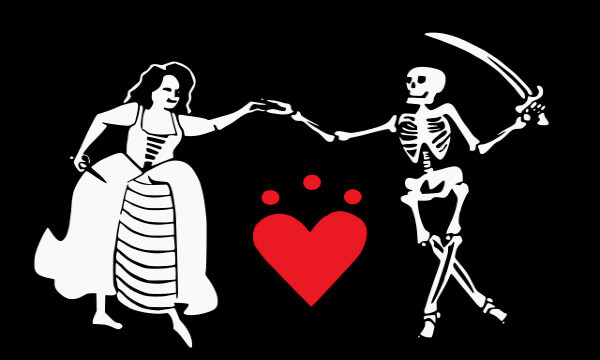
Jolly Roger of Jacquotte Delahaye, female pirate
The worst nightmare for a merchant ship was (and is now) to see a Jolly Roger on the horizon. It may appear romantic in games, on avatars or tattoos, but it is absolutely not your dream when you make way in neutral waters. God bless all sailors.
MATE — or “matey” is a friend, a buddy, a dude, a crew member. Aussie use “mate” in the same way nowadays, and it originates from the maritime slang. For example, the First Mate is the official title for the Captain’s right hand officer even nowadays, especially in the navy. I suggest there is obvious logic how the word “mate” landed in Australia and took its iconic place in the Australian dialect of English.
JERK — is salted and/or smoked beef cut in stripes. Used widely along the whole time span of the Age of Sail and beyond as the best opportunity to carry beef and keep it well in any conditions for an endless term. Jerk is offered widely as a common food component everywhere in the Caribbean even now. You put one into water before cooking for almost an entire day, and it still stays a salty piece after that, m-m, and heavenly tasty when properly cooked.
BUCCAN — salted/smoked beef, over-salted to be precise, similar to “jerk”, it usually cut in stripes, then smoked open-air under sun, or fire.
This buccan is, in fact, the very source where the “Buccaneer” as a term to refer to pirates originally comes from. First, it was one of the common civil professions in Tortuga for men in 1666. Second, buccaneers were also hunters, they hunted wild bovine which they cooked, smoked and salted, producing so a vital stock of well-stored food for ships.
BUCCANEER — is a pirate. As we mentioned just above, before being a pirate he was a hunter for wild bovines in Tortuga to make and trade buccan, salted smoked beef, among other cheap food products of the kind. I think buccan is a sort of localized version, geographically by Tortuga, and culturally by the seafaring community; while jerk is already a common term for this kind pf beef. Do you see similarities in sound for bacon and buccan, except that the former is port, and the latter is beef allegedly wild?
Imagine, the island of Tortuga was not rich in professions at all, hence everyone struggled for low pay, including the wild bovine hunters, and those were numbers in Tortuga of the time.
The buccaneers in Tortuga fated to be all-in-one: they were skillful hunters, butchers, also cooks, but yet resulting in low pay. Aye, and they were a crowd, or should we say a ready-made pirate crew!?
Of course, the deadly combination of physical strength, agility, virtuosity on survival, cooking, and weapons, both cold and firearms, inevitably formed a perfect set of skills to be a good pirate.
BUMBO — also Jumbo, or Jumbee, is a rum drink of the Caribbean pirates, the cocktail: rum, sugar, water, nutmeg and lime. Aye, the fictional pirates animated in movies, cartoons and literature seriously omit the gourmet preferences of the buccaneers:
— BUMBO was very easy to make in the conditions where the pirates were, from the components they had. The resulting rum drink contained lots of fresh lime juice effectively helping to restore the proverbial lack of Vitamin “C”. Lime grew everywhere in the region and it costs as much as sh*t even now in the Caribbean and South America. Savvy?
— NUTMEG was often a cargo due to its high demand in Europe, therefore presumably available on boats as in general. Nutmeg is commercially cultivated in the Caribbean till now, where Grenada is among the nutmeg-leading countries: there is nutmeg on the national flag of Grenada.
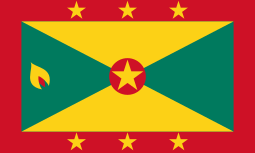
Nutmeg — on the flag of Grenada
— NUTMEG contains psychoactive components and may provide mild hallucinogenic effects naturally. Also, nutmeg increases anandamide, the natural endocannabinoid in the human body. Aye, you read it right, THC (the psychoactive compound of marijuana) mimics anandamide and contracts the CB-receptors in the brain, this is why and how we get high, as of the discoveries performed by Dr. Raphael Mechoulam.
So, nutmeg affects the levels of anadamide delivering the euphoric “happy highness”, same idea as in black pepper, marijuana, vanilla, chocolate, etc. May be toxic in bigger amounts but for a cocktail should be fine.
— Do the buccaneers of the Caribbean appear as some lousy drunkards now? Aye, the lousy drunkards were able to capture whole islands, establish Free Republics as in Bahamas and Tortuga, trying to prototype a constitution (a law) in a form of that famous Pirate Code. They drank rum mixing it with water and lime and expensive spices as if it was a cocktail in a fancy modern-day bar.
Psychedelic means spiritual, am I right? Of course, there were bad guys among the Caribbean pirates, but not all of them. I think many wanted to find freedom and equity as their principal purpose.
We shall continue with the word list in a moment, right after the Bumbo recipe.
Bumbo / Jumbo ♥ Pirate Rum Cocktail Recipe:
Bumbo, Jumbo, or Jumbee is a pirate drink, so it is tasty, high, and easy for cooking. The ingredients for the original Bumbo rum beverage are as follows:
✴ 2 (oz) of Rum p/p,
✴ A whole OR a half of lime p/p (squeezed juice),
✴ Three tablespoons of cane sugar p/p,
✴ Nutmeg is very important!
✴ 3 (oz) of Water.
Pour rum into a tin or a mug, squeeze half a lime or a whole, add sugar not much, unless you wish a very special headache in the morning as of my personal experience, yet Bumbo is rather sweet cocktail. Then crush, grind or grate nutmeg into the mix. Note that crushing, grinding or grating nutmeg always provides a richer taste and aroma rather than using or buying the already ground one — some terpenes contracting your receptors are volatile, we do not want to lose them. Then fill the rest of your tin or mug with water, roughly 40/60 adjusting the ratio to personal preferences. Shake or use a wooden stick to stir. Bumbo is a pirate rum drink, which results in easy to make, and easy to moderate buzz because you do not wish to crush your barnacles. So enjoy it!
GROG — is yet another a rum cocktail, a mixture of water and rum, a simplified Bumbo, suggested by Admiral Vernon as a daily (and big enough) portion of strong alcohol for sailors in the British Navy.
The nickname of the Admiral within the maritime community of the time was Old Grog even before the Grog rum drink. The English naval tradition of drinking a mug of grog two times a day, for every soul, no exceptions, got abolished only in the second half of the 20th century.
We shall continue with the word list in a moment, right after the Grog recipe
Grog ♥ Royal Navy’s Rum Beverage:
Being an obvious derivative of Bumbo-Jumbo pirate drink, Grog inherits the same idea of making the finest time-tested rum cocktail; but grog is a simple (less ingredients) version of that bumbo, designed for navy and lasted there for 400 years, while all this time free people enjoyed bumbo. Okay.
The mentioned clever memo for the ingredients of rum beverages, for all three Grog, Bumbo, Hot Bumbo (or Jumbo) rum recipes:
1 — one part Sour (this is lime),
2 — two parts Sweet (sugar),
3 — three parts Strong (rum),
4 — four parts Weak (water).
Remarkably, the ration of water to rum aligns to “the golden ratio”.
Nutmeg is out, that’s the principal difference. Unless you borrow one from cargo, if you are a navy, or just be a pirate to taste a better rum beverage.
Kidding, of course, just a gamer pirate is the utmost pleasure per se, and especially when sipping bumbo playing at home, ha-ha.
We shall continue the word listing right away after the Hot Bumbo/Jumbo recipe.
Hot Jumbo ♥ Rum Beverage Recipe:
A charming modification for the Bumbo (or Jumbo) rum recipe — the mod we have once discovered, quite suddenly, and it out top preference for several years since then.
So the hot rum beverage is a practically boiled rum cocktail, you boil it and you take while it’s as hot as coffee. Hope you love hot alcoholic beverages, but I confirm this one is a very outstanding contester. Even if you are neutral to hot alcoholic cocktails, give this one a special chance, no regret 👍
Ingredients for the hot rum beverage are the same, but the cooking is a little complicated, just a little. The 1-2-3-4 memo fits entirely for this one too, and don’t forget nutmeg.
✴ 2 (oz) of Rum p/p,
✴ A whole OR a half of lime p/p (squeezed juice),
✴ Three tablespoons of sugar p/p,
✴ Nutmeg is important!
✴ 3 (oz) of Water.
Pour a little less than half of a standard mug into a pan, two times if making it for two people, you and your crush. Water shall boil out, add a splash on top. Add sugar. Crush, grate or grind nutmeg as it must be exposed to heat together with all the ingredients, but Rum stays at room temperature. Don’t you use/buy an already ground nutmeg nut, some terpenes are volatile.
Heat water, sugar and nutmeg altogether on a slow fire in a pan until sugar dissolves. It takes roughly a minute or two over the boiling point to give a good heating to nutmeg inside the syrup. While boiling, take it off from fire a few times to make round moves of the pan for faster sugar dissolution. Let the resulting hot syrup rest to get a few degrees below the boiling point, give it half a minute or something, or splash a couple of splashes of room-temp water instead. Pour the syrup into tins or mugs, add rum, roughly 2 parts of rum into 3 parts of syrup, the “golden ratio”. Stir the resulting drink with a wooden stick or simply by performing round moves with a mug in a hand. Serve it right away. Squeezing a splash of lime juice into a ready mug should not harm if it is a very good lime or, better, skip the lime rather than using a doubtful lime. Enjoy!
The proper heating of nutmeg in the solution for the Hot Jumbo (or Bumbo) rum cocktail recipe shall give color to the drink. In my case, it becomes either slightly pink or slightly yellow. It may vary because of nutmeg genetics.
CUT OF ONE’S JIB — describes one’s intention, one’s character, one’s business, nationality, whatever forms a PERSONALITY. Basically, a JIB is a foresail or a couple of such shaped in a form of a triangle, located between the foremast and the bowsprit. “Cut” means shape, and the shape of a jib helped to see a nationality of a ship and/or the origin of the boatyard, more important maneuverability and, consequently, a purpose — count it all as a “personality” or a “character” of a ship and her crew.
Cut of your Jib use-case:
IMAGINE — A modern cutter-rigged pleasure yacht carries two jibs (in the picture above). You see from a distance that her inner jib is a “storm jib” settled, but the weather is fine this day. You logically conclude the boat’s purpose may be a longer journey with her next stop far beyond today’s weather. The skipper is probably not a day skipper on a day charter, but a thoughtful one or a lazy one — somewhat experienced. Some knowledge you’ve gained from the cut of the jib. Now you are in the Caribbean in 1666, and it’s time to decide if you are going to board this cutter or shoot her from a distance or maybe flee this time.
CAT-O-NINE-TAILS — often shortened to “the cat” is a multi-tailed flail (a whip) used for physical punishment, aka the Captain’s daughter. The punishment by the cats is shown here below in a few frames of animation from the POPEYE cartoon series 💥 😜 I can imagine the real cat was not that funny.
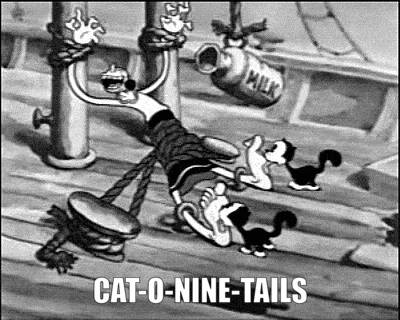
Olive Oyl got punished by “cats” on a pirate boat
CRUSH ONE’S BARNACLES — an idiom meaning to kick ass, including the usage as cursing or threatening. The underwater part of the hull of a boat is normally covered by a whole colony of barnacles, mussels, and other sea creatures. The scientific name of the process is “fouling”, and there is a whole “coral reef” underneath once you feel lazy about cleaning the boat bottom timely. If someone crushes another one’s boat in a battle, I can imagine, the barnacles and their charming coral exoskeletons shall fly broken into all directions. Well, this is the idiom.
TRIM — means well-settled, well-balanced, ready to use, in a great order. See the “shipshape” definition on this page to which “trim” is not an equality but describing the situation. As for the theme of this website, let me add yet another example that you trim marijuana buds to make them shipshape for the commercial distribution or for long-term storage.
ALL HANDS — means an entire crew without exception, including officers of any rank, including everyone, regardless of a shift, literally all people possibly available. An example of usage is allocating “all hands” for a task.
TIMBERS — is the framework of a boat, the hull.
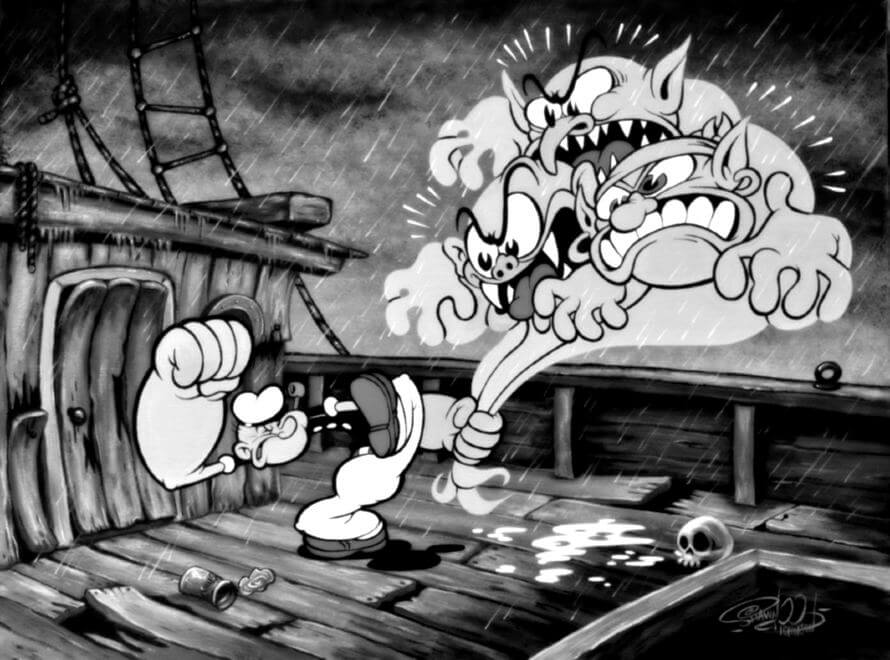
POPEYE episode 12 named “Shiver Me Timbers!” (1934)
SHIVER ME TIMBERS — is an idiom to express a shocking surprise, including as cursing, swearing or an exclamation. When a boat suddenly touches anything significant in water, then everything and anyone inside a boat are shocked and strongly shaken as if you hit a whole iceberg. It can be a floating log or a seal bumping you (they really do at times!) either a sea bottom contacting the keel once the shallows got underestimated. Every time a hit on a hull comes loud, suddenly shaking the timbers, spreading an immediate panic. “Shiver me timbers!” is equal to “Blow me!”
WEATHER-EYE OPEN — or “keep one’s weather-eye open”, is to express the following: “be alerted”, “stay alerted”, “keep watching”, “be on watch”, “watch out”. The weather is a matter of your safety at sea, you need to keep a weather-eye open to know in advance once it’s going to change.
ANCHORS AWEIGH — is a situation in which the movement starts when an anchor is going up and starts giving weight to the chain, and it means it is clean and has already untouched the sea floor where it was lying moments before. Consequently, the boat starts the movement safely. An equivalent to “Let’s go”. Sometimes shortened to “Aweigh!”.
TACK ABOUT — is to waste time or beat it round the bush. The saying comes from “tack” a naval language term for changing the course of a ship, making the wind approach from the other side, and while performing the maneuver the bow of the boat points to the wind at some moment. Like, when your goal is opposite to the direction of the wind, you’re making way in a “Z” shape, and you tack a lot.
This image shows a sailboat tacking. Tap on it to find credit information. Does the movement of a boat appear as if she is performing clearly a demonstration of a “tacking about” idiom? Ha, this is what you do when you tack — you beat around the bush, no less. As for my personal preference, I love going at a sharp angle to the wind because the wind is less disturbing in this position, the speed is good, and the boat sits steady in the water. But maybe a beam reach (90-degree course) is optimal as there is no need to tack too much when on a beam reach course.
What is not listed among the words Pirates of the Caribbean used?
Don’t you feel distressed that the famous “Argh” is out of the list. Of course, it is a very recognizable pirate roaring, loved by children, designers and Jesus’s birthday animators. However, the roaring, the organic sound Pirates of the Caribbean surely performed, is not yet a slang word, neither a professional terminology.
We excluded some entries of the maritime vocabulary we doubted or felt uncertain about. One of such was “Beat to quarters”, an alarm signal. When the “Master and Commander” movie starts, a young marine officer shouts demonstrating a perfect articulation: “WE SHALL BEAT TO QUARTERS!” then drums follow and the extraordinary naval discipline makes all hands stand at the positions in a minute, remember? One of the best movies on the topic, by the way; however, who on Earth can imagine the pirate ship doing the trick navy performed in the “Master and Commander” motion picture?
Tue, 18/Jan/22
